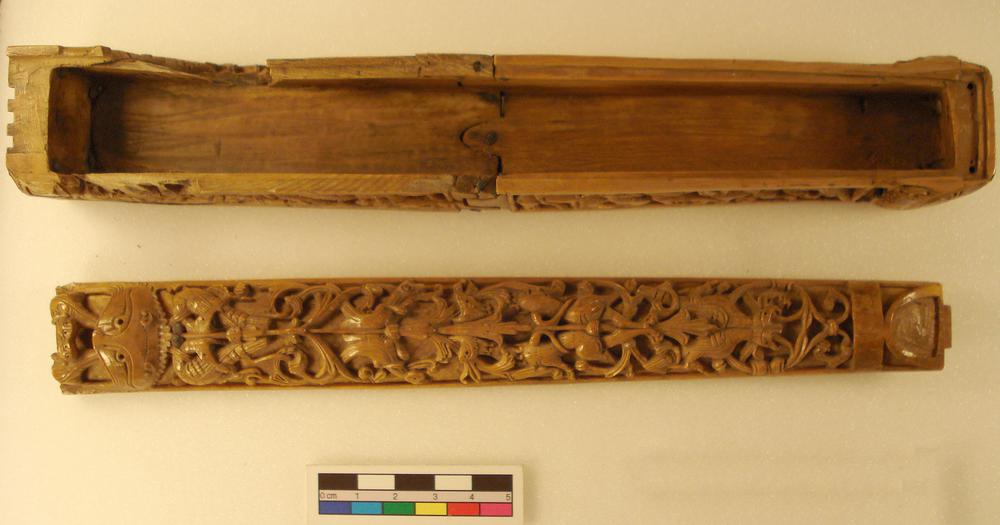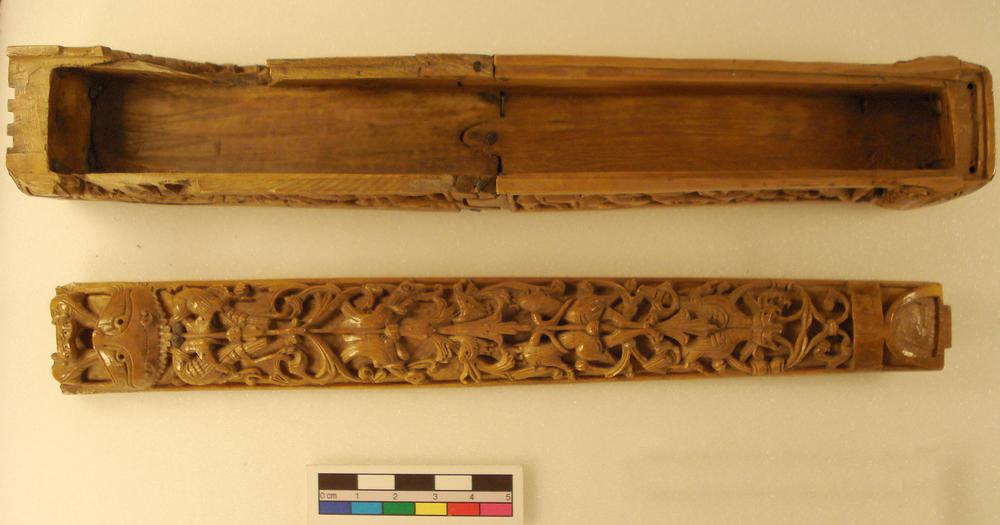Norman Conquest: On the Eve of Conquest
1/40
There's no tags or description
Looks like no tags are added yet.
Name | Mastery | Learn | Test | Matching | Spaced |
|---|
No study sessions yet.
41 Terms
What was the role of the king in Anglo-Saxon society?
Owned the most land
Issued laws
Responsible for justice
Responsible for the work of the Church
Raised taxes
What was the role of the Earls in Anglo-Saxon society?
King’s chief advisors
Couldn’t own armies but led the King’s armed forces
Rivalries, plots and murders made England unstable
Most powerful Earl was Harold Godwinson
What was the role of thegns in Anglo-Saxon society?
High status came from land ownership
Had to hold 250 hectares of land
Most lived comfortably
Roughly 5000
Fought if necessary
Carried out the kings work such as running local courts and collecting taxes
What was the role of ceorls in Anglo-Saxon society?
Most of the population
Some had special skills such as carpentry or blacksmiths
Most worked the land
Owned some land and a house but had to pay rent to a thegn
Expected to fight in the king’s armed forces
Who were thralls in Anglo-Saxon society?
Slaves- property of their master
Not free to work elsewhere
10% of the population
Some captured in wars or sold into slavery
Anyone born a slave remained one
What were the lives of women like in Anglo-Saxon society?
Had the legal right to own land and property
Could divorce a husband who committed adultery- cases of this were very rare
Fines for sexual harassment
In charge of the household stores and money
What percentage of land was owned by women Anglo-Saxon England?
5%
What is wergild?
The value of life
If someone had killed another person, they could pay the price or be killed
King 18000 shillings, Prince 9000, Earl 4800, thegn 1200, Ceorl 160, thrall- no value
When was the Roman Catholic Church brought to England?
597 AD
What religion were the Anglo-Saxons before Catholics?
Pagans
What was the Church influenced by in the North of England?
Missionaries from Ireland
Why is art produced by the Church in England different to other Christian art?
Because they avoided straight lines and preferred elaborate patterns made up of interlaced bands
How did the English Language in Anglo-Saxon times affect the Bible and the Church?
The Bible was written in old English
The Catholic Church only wanted the Bible in Latin because they didn’t want anything to be lost in translation
This shows that the Church in England was independent and the monks continued to write extracts of the Bible in English
How did people worship in Anglo-Saxon England?
People gathered around large stone crosses to worship
Only after the Normans arrived did each village have it’s own stone Church
What did the Pope in Rome complain about with the Church in England?
The Church in England had too many saints and saints were supposed to be appointed by the Pope
How were Anglo-Saxon behaviours and beliefs influenced by Catholocism?
Behaviours like binge-drinking, overeating and indulging in sex were criticised
Pagan beliefs like witchcraft and spells were criticised
Who was St Dunstan?
Monk from Somerset
Became the Archbishop of Canterbury in 960 AD
Devoted, generous and selfless
What standards did St Dunstan have for the Church?
Insisted priests should not marry
Improved education and commitment of nuns, monks and priests
Organised the rebuilding of many churches, abbeys and monasteries by donations of thegn who wanted monks to pray for them
Wanted to end greed/corruption
Why were there no more Church reforms after St Dunstan died?
Because of Viking raids in 1011 destroying much of Canterbury
Who was Stigand?
1065- both the Archbishop of Canterbury and bishop of Winchester- holding two positions is pluralism which is frowned upon
Did little to improve the Church
Served the King and Harold Godwinson as an advisor
How was Stigand corrupt?
Sold of Church positions to the highest bidder- simony
He had two positions in the Church of the Archbishop of Canterbury and the Bishop of Winchester- pluralism
Had influence because of Harold Godwinson, Earl of Wessex
Gained land in ten shires and became rich, making some generous gifts to churches and monasteries
How did the Pope try to convince Stigand to give up his position of Bishop at Winchester?
The Pope was deeply upset and offered to give him an official blessing
Stigand ignored him and stayed in England
What were Anglo-Saxon villages like?
Houses made of wattle and daub, main building material was wood
Houses had a hearth (fire) with a hole in the ceiling to let smoke escape
The church was very important
Rivers were full of fish to eat and sell to make money
Earls had many facilities like guesthouses, storehouses and areas for soldier training
What was the Alfred Jewel and what does it tell us about the Anglo-Saxons?
Intricate shapes and patterns
May have been attached to a long stick
Used to identify words and images in manuscripts
Sent around the country in 890 AD by King Alfred
Tells us the Anglo-Saxons were skilled craftsmen and they could work with precious metals
What was the Fuller Brooch and what does it tell us about the Anglo-Saxons?
Represents the five senses
Example- man at the centre staring with open eyes represents sight
Tells us they had remarkable skills as craftsmen
They were used to working with precious metals

What is this pen case and what does it tell us about the Anglo-Saxons? (See image)
Made from walrus ivory
Engraved with dragons, lions, birds of prey and human hunters
Used to hold quill or musical instrument
Shows they had remarkable skill as craftsmen and they could work with precious materials

What was the Anglo-Saxon calendar and the Marvels of the East and what do they tell us about the Anglo-Saxons?
Contains information about the world
Information about astronomy
Information about far off places in Marvels of the East
Images of half man half lion and a giant eating a human
Shows the Anglo-Saxons were trying to learn about the world but they were not very knowledgeable
What is Beowulf and what does it tell us about the Anglo-Saxons?
3000 line long poem
Beowulf hunts down and slays a monster
Nor originally wrote by Anglo-Saxons but popular among them
Shows Anglo-Saxons were interested in literature and passed it through word of mouth
What is the Anglo-Saxon Chronicle and what does it tell us about the Anglo-Saxons?
Monks wrote a history of Britain staring with the arrival of Julius Caesar
Copies made in monasteries around England
Ordered by Alfred the Great
Monks updated history books independently until the 12th century
Had gaps and was one sided
Shows the growing sense of identity as a nation
What was the Exeter Book and what does it tell us about the Anglo-Saxons?
Largest known collection of Anglo-Saxon writings
Most famous writings were riddles
Had sermons, poems, biographies of saints, medial treatments, advice on grammar
Shows the Anglo-Saxons wanted to pass on their works of literature and they started writing it down
What were buildings like in Anglo-Saxon England and what does it tell us about the Anglo-Saxons?
Almost entirely wood
All rotted away now
Had upright timbers
Rectangular, single storey, thatched roofs
Thegns lived in large, two floor houses
Built in simple shapes- rectangles and squares
Shows Anglo-Saxons mainly only knew how to use wood
What was the Nunnery at Wilton and what does it tell us about the Anglo-Saxons?
Fairly small
Compared to the temple of Solomon by an Anglo-Saxon writer
Fine wooden carving
Beautifully painted plasterwork
Winding staircase
Precious stones and ornaments
Delighted in garments worn by nuns
Shows Anglo-Saxons had great skills of weaving, building and embroidery
What were burhs and what does it tell us about the Anglo-Saxons?
Only 3 by 1065
Surrounded by walls- few made from stone
Londonburh (London) had growing importance
Defended by earthwork of ditches and ramparts with a strong wooden barriers
Anglo-Saxon were growing their country
They had effective systems of defence
What were Churches like and what does it tell us about the Anglo-Saxons?
The only stone buildings the Anglo-Saxons had
Replaced wooden shelters for worship
Ground floor was where people stood for worship
Decorated
Buildings made of wood were uncommon except for churches
Shows Anglo-Saxon were developing their building and becoming more devoted to Christianity
What is Westminster Abbey and what does it tell us about the Anglo-Saxons?
In London
Made in the popular style of abbeys in Normandy
Made from carefully cut stone
King Edward tried to make it as splendid as he could
Opened on 25th December 1065
Shows Anglo-Saxons adopted other cultures and they were becoming more skilled builders
What reasons may Anglo-Saxon life seem ‘golden’ regarding society?
Women had rights- owned land, could divorce
Wergild- value of life
One of the wealthiest states in Europe
Could move up or down classes
What reasons may Anglo-Saxon life not seem ‘golden’ regarding society?
5% of land owned by women
Cases of women using their rights were very rare
10% of people were thralls
Political instability due to rivalries between earls
King Edward the Confessor was weak- Harold Godwinson ruled
What reasons may Anglo-Saxon life seem ‘golden’ regarding religion?
English Church worshipped differently to Europe such as the Bible being in English instead of Latin
St Dunstan worked to end corruption within the Church
Building of churches, abbeys and monasteries
What reasons may Anglo-Saxon life not seem ‘golden’ regarding religion?
Some pagan beliefs still remained for example, a pagan ring found in Essex with Christian and Pagan symbols
Stigand was very corrupt- involved in pluralism and simony
Many priests were uneducated and married
What reasons may Anglo-Saxon life seem ‘golden’ regarding culture?
Decorative items show Anglo-Saxons were skilled craftsmen like the Alfred Jewel and Fuller Brooch
Literature shows interest in science and history- Marvels of the East and Anglo-Saxon Chronicles
Growth of church buildings shows commitment to Christianity
What reasons may Anglo-Saxon life not seem ‘golden’ regarding culture and buildings?
Most buildings made of wood- prone to fire and rotting
Burhs kept people safe- shows there was a fear of attack or lawlessness
Written history could be one sided and had gaps such as the Anglo-Saxon Chronicle